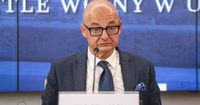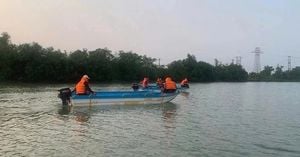In a dramatic turn of events within the Polish Senate, Michał Kamiński, a member of the Third Way political party, has accused Senate officials of attempting to spy on him by pressuring his driver to report on his personal activities. This shocking allegation has sparked a heated exchange between Kamiński and other prominent political figures, including Senate Marshal Małgorzata Kidawa-Błońska.
Kamiński made his claims public during an appearance on the TVN24 program "Tak jest," where he stated, "My driver was asked to report on me." He alleged that this request came from officials subordinate to Kidawa-Błońska, who he accused of employing "UB methods"—a reference to the oppressive tactics of the former communist security service.
According to Kamiński, his driver was approached in writing, with a document demanding that he inform the Senate about any of Kamiński's absences, including health issues and personal meetings. "The document said, 'I oblige you to inform me of any absences of the deputy marshals,'" Kamiński recounted, emphasizing the invasive nature of the request.
In response to this alleged spying, Kamiński's driver reportedly refused to comply, stating, "He said he would not inform about my illnesses, my family life, where I travel, and who I meet with." This refusal, according to Kamiński, led to concerns that the driver might be reassigned due to his noncompliance.
As the controversy unfolded, Kidawa-Błońska reacted strongly to Kamiński's accusations. She expressed her outrage during an interview with TVN24, stating, "I am outraged. I never thought that Mr. Michał Kamiński could react so nervously and accuse something that did not happen." She further claimed ignorance regarding the email in question, asserting, "What do I care about the health of Mr. Michał Kamiński or the driver? The senator comes to work, the deputy marshal presides over the meetings, and is at the sessions. Mr. Kamiński probably thinks too much of himself."
The Senate Marshal argued that the purpose of the communication regarding deputy marshals' absences was purely administrative, aimed at allowing drivers to manage their time effectively. "If the marshal goes on vacation or does not come to work for several days, the driver could perform other activities. This is the only point," she clarified.
In a statement released through social media, the Senate Chancellery supported Kidawa-Błońska's position, asserting that the correspondence was conducted solely to enhance work organization among drivers serving all deputy marshals. They emphasized that the communication was not intended to monitor any deputy marshal's activities.
Amidst this political turmoil, Magdalena Biejat, another deputy marshal from the Left party, expressed her concern over the allegations. "If it is true that someone expected drivers to spy on coalition partners and report on their health, it is a scandal. I will ask the Senate Chancellery for explanations," she stated, highlighting the seriousness of the accusations.
Kamiński, undeterred by the backlash, stood firm in his assertions. He expressed disbelief that Kidawa-Błońska could have been unaware of the situation, saying, "If Mrs. Kidawa-Błońska wanted to know whether I was healthy or sick, she could have asked me, but she never did. Instead, she sent drivers to spy on me."
He further claimed that the atmosphere within the Senate had become toxic, stating, "This is not European standard, Mrs. Kidawa-Błońska. This is disgusting, and I cannot find words for such behavior, to obligate drivers to spy."
The situation escalated when Kamiński revealed that he had reviewed his statements made on TVN and found no grounds for the accusations against him. He stated, "I did not say anything about the Marshal, quite the opposite. I said I hope she did not know about this. I was talking about her officials."
As the political fallout continues, the Senate is expected to convene an ethics committee to investigate the matter further. Kamiński has explicitly stated that if Kidawa-Błońska lacks the courage to face the ethics committee, he will welcome the opportunity to present his case and defend his integrity.
This incident raises significant questions about the conduct of Senate officials and the boundaries of privacy and personal autonomy within the political sphere. As the Senate prepares to address these allegations formally, the public remains watchful, eager to see how this political drama will unfold.
In a world where transparency and accountability are paramount, the implications of such accusations could resonate far beyond the walls of the Senate. The unfolding saga not only reflects the internal dynamics of Polish politics but also highlights the critical need for ethical standards that protect the rights and dignity of all individuals involved.








